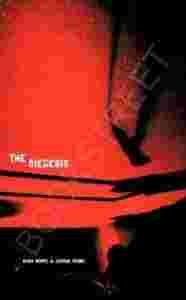|
Whether the alluring notes of its language or the
crooning soundtrack of Tom Waits and Leonard Cohen, song
is inescapable in The Diegesis. Chainsaws and gunshots
are as plausible as the echoes of 80s night, and this
polyphonic collision attends the still images and
tracking shots that measure our interior worlds. Ghostly
machinery and figures inhabit these deft poems, but
those living are often no less haunting as they bridge
past and present with stories found in celluloid or even
dropped from the sky. Chas Hoppe and Joshua Young
propose action that resides beneath the action: just
when we think we've never seen a tattered silk so
astonishing, its luminous wings emerge. - Michael
Robins, author of Ladies & Gentlemen// The lack of
fear in Chas Hoppe and Joshua Young's The Diegesis is
apparent in the first line: "You want the past to mean
everything." This is book as confession, book as meta
emotion, book as Hollywood film set. Footnotes litter
the pages like empty clothes leading to a full bed. This
is book as fire alarm, book as intimate conversations
caught on tape, and we should feel grateful to be
invited in. Take footnote number five: 'i'm gonna be
more famous than you even realize.' But what Hoppe and
Young don't understand is that we do realize. How could
we not? I read parts of The Diegesis out loud to my
girlfriend. I said, "This book is kind of awesome," but
I should've edited that. I should've said, "This book is
awesome." I should've said, "It is currents. Often the
electrical kind, always the human kind." -Gregory Sherl,
author of The Oregon Trail is the Oregon Trail//
Abundant with poetic moments, overheard voices,
metaphoric implications of narrative and film,
flourishes of image, The Diegesis is a book that
arrests, makes you want go back, leaves you nostalgic
and heartbroken for lost moments, obsolete objects. You
wish to but cannot push rewind. The book is an exercise
of splicing at its literary best and will make you
wonder how Chas Hoppe and Joshua Young pulled off such a
flawless performance in collaboration and poem-making. I
loved being hit, unawares, time and time again, by the
freshness of the language, how each poem contained, like
a bonus track, a hidden surprise gift. -Jenny Boully,
author of not merely because of the unknown that was
stalking toward them
|
|

